Let’s get one thing straight from the outset; this is NOT an article about steroids! Most steroids are artificial forms of testosterone. Some bodybuilders and athletes take steroids to raise their testosterone levels far beyond what is possible naturally, although some are less than honest about their steroid use!
While it’s clear that “being on the juice” will have a significant impact on strength and appearance, it can also be very dangerous, especially if used in massive amounts or for long periods.
Instead, this article is about natural testosterone production and what you can do to boost your levels naturally.
What is Testosterone, Anyway?
Testosterone is a hormone or chemical messenger that tells specific cells in your body how to act. Both men and women produce testosterone, but, in general, men have around ten times the amount of testosterone as women. Testosterone, sometimes simply called T, is essential for making you muscular and lean, so it’s in your best interests to know a little more about this marvelous man-making hormone.
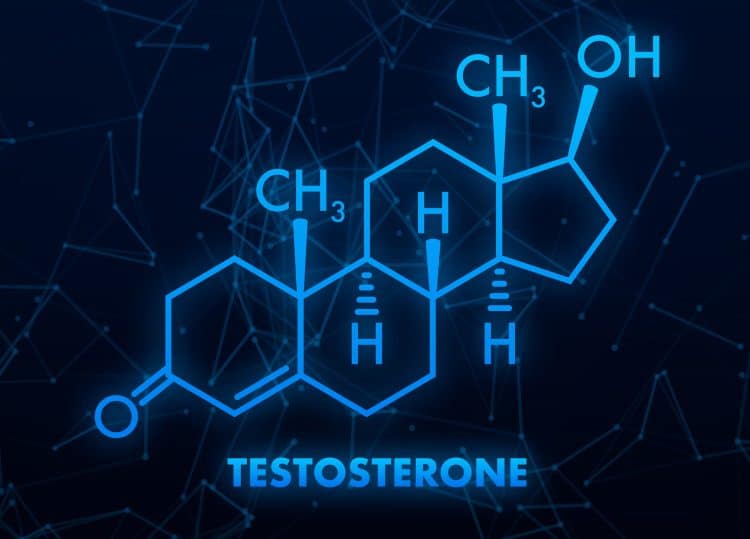
Testosterone is both anabolic and androgenic. All that means is that it aids in muscle growth (anabolic) and is also responsible for the development of the secondary male characteristics such as body hair and beard growth, your deep voice, and sex drive (androgenic).
Your testosterone levels peak in your mid to late twenties and then start a slow and gradual decline after that.
There are several things that can hasten this decline, including eating a low-quality diet, doing too much cardio, smoking heavily, testicular trauma (getting kicked in the balls), exposure to too many toxins, being over fat, and eating too many estrogen-forming foods, such as soya.
If your testosterone levels fall too low, you could be said to be suffering from a condition called andropause.
Andropause results in very low T-levels and is typically treated with hormone replacement therapy (HRT), including testosterone gel, patches, or injections – which are all basically doctor-prescribed steroids, albeit in therapeutic rather than mega-sized doses.
In contrast, moderately low testosterone levels are often left undiagnosed and, more importantly, untreated. Subsequently, many men go through life with below-average testosterone levels and feeling far less formidable than they really should but without suffering true andropause.
If you experience any of the following, you may well be suffering from low testosterone levels. You might not be fully in the grips of andropause, but if your T-levels are a bit on the low side, you may have one or some of these symptoms…
- Reduced sex drive
- Fatigue
- Reduced motivation
- Difficulty building muscle
- Difficulty shifting fat/losing weight
- Mood swings
- Difficulty sleeping
- Difficulty concentrating
- Forgetfulness
- Decreased bone mass
- Loss of body hair/reduced need to shave
- Hot flushes/sweats
Needless to say, no man should go through life feeling like this.
If you suspect that you may have below-average testosterone levels, your first port of call should be your doctor.
A simple saliva or blood test will reveal if your T-levels are normal or low. If they are very low and you are genuinely suffering from andropause, you may be a candidate for HRT.
However, it’s worth noting that HRT really only treats the symptom of low testosterone and not the cause. If you are not interested in having kids, then HRT is a very good solution, although it is not entirely risk-free. However, if you still want to have children, you should hold off on HRT because it has a contraceptive effect.
If HRT is not for you, there are several things you can do to get your testes working more efficiently and boost your testosterone levels naturally.
Nine Ways to Boost Testosterone Naturally
Getting your testosterone levels up and out of the doldrums requires a holistic or multidirectional approach. It’s not enough to simply eat some “superfoods” or pop a few supplements.
Your lifestyle, diet, and exercise regime all need to be aligned to the goal of increasing your testosterone levels.
Use the following strategies to increase natural testosterone production.
1. Increase your intake of quality fats
Fat is often said to be unhealthy. After all, it’s linked to heart disease, weight gain, and a host of other medical problems.
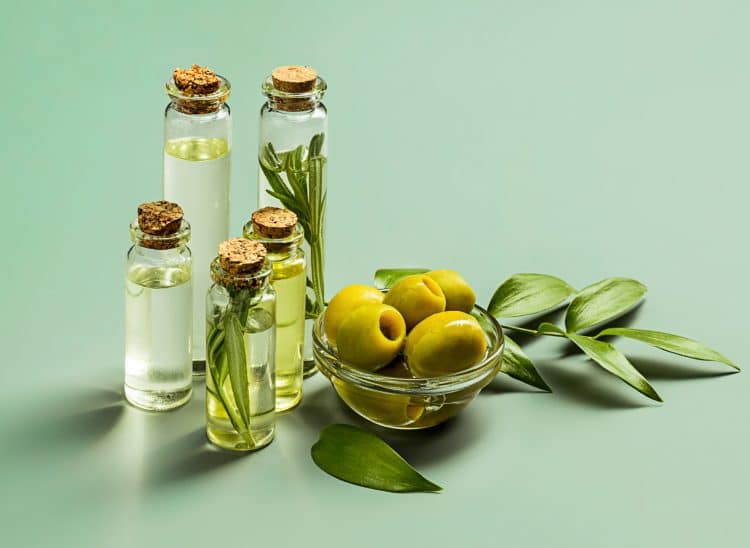
However, fat also plays a vital role in testosterone production. Fat and cholesterol are essential for the synthesis of many hormones, including the mighty muscle builder that is testosterone.
The problem with the “all fat is bad” mindset is that it doesn’t take into account that there are several different types of fat, and some are better for you than others. Trans fats, for example, are very unhealthy and are linked to a host of illnesses. In contrast, essential fatty acids (EFAs) are very healthy, and your body needs them in abundance.
The best fats for increasing testosterone levels include:
- Olive oil
- Fish oil
- Coconut oil
- Egg yolks
- Nuts and seeds
- Avocados
According to studies, low-fat diets could be partly responsible for low testosterone levels (1). Consuming plenty of healthy fats can help increase your testosterone levels by providing your body with the building blocks it needs to synthesize this hormone.
2. Lift heavy at the gym
If you want to build muscle, you need to hit the gym. But to build muscle, you also need adequate testosterone. So, what if your T-levels are low? Does this mean you are doomed to pointless workouts that don’t produce any meaningful results?
The good news is that, with a few modifications, your gym workout can help increase your testosterone levels, making your gym time more productive.

To turn your workout into a T-booster, you need to follow these guidelines:
- Focus on large muscle groups, such as your legs, chest, and back
- Use primarily compound exercise. Think squats and deadlifts and not leg extensions and leg curls.
- Use heavy weights – aim for 6-8 reps per set
- Use short rests between sets, with 1-2 minutes being optimal
- Train 3-4 times per week to allow adequate time for recovery
- Keep your workouts to an hour or less
Many golden-era bodybuilders trained like this and built incredible physiques without steroids and supplements. Research suggests that their workouts were at least partially responsible for optimizing their testosterone levels naturally, leading to such great results (2).
3. Get more sleep
Sleep is often seen as a luxury that many people cannot afford. Work and family commitments mean that many of us get by on much less than the recommended eight hours of sleep per night.

In studies on serving military personnel, sleep deprivation was linked to lower testosterone levels, so it makes sense that getting more sleep can boost testosterone (3).
When you sleep, your body goes into recovery mode and gets busy repairing itself after the stresses of the day. To facilitate this, levels of testosterone and growth hormone increase. If you don’t get enough sleep, the window for anabolic hormone production will be much smaller, and testosterone production will be lower.
In addition, too little sleep increases levels of the stress hormone cortisol. Cortisol is catabolic, which means it causes muscle breakdown. It also suppresses testosterone production and increases fat storage. In short, too little sleep does a double-whammy on your T-levels.
Getting enough sleep is not always easy, but the process starts with going to bed earlier. Work back eight hours from the time you need to get up. That should be your bedtime.
4. Watch your blood pressure
There is no getting around it; your body functions better when you are fit and healthy. Things like being overweight, sedentary, or eating unhealthily can have a significant impact on all of your bodily functions, and that includes testosterone production.
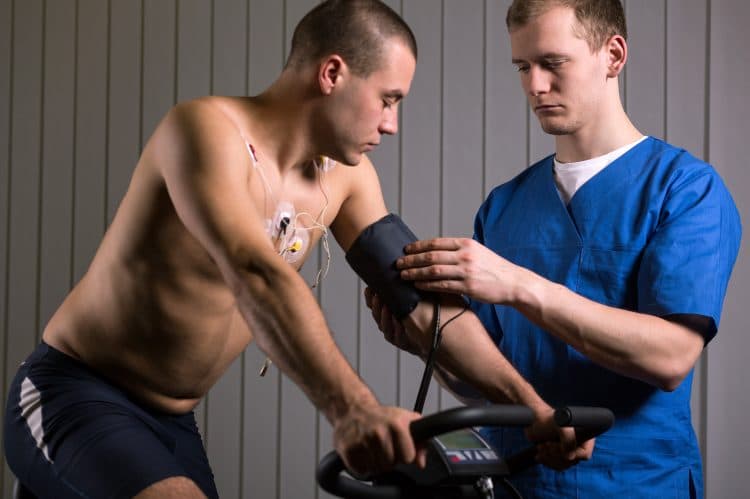
Scientists at the University of Tsukuba in Japan have established a link between high blood pressure and low testosterone (4). High blood pressure is a very common problem amongst men.
Diet, stress, age, and body weight can all cause an increase in blood pressure. Unfortunately, high blood pressure is all but asymptomatic, which means you can have it and not know it. The only way to find out if you have high blood pressure is to have it tested.
Get your blood pressure measured to see if it’s interfering with testosterone production. If your reading comes out on the high side, follow your doctor’s advice, and reduce it. This won’t just increase your T-levels; it could also save your life! High blood pressure is inextricably linked to heart disease.
The commonly accepted ways to lower blood pressure include:
- Eat less sodium and salty food in general
- Eat more potassium-rich foods such as bananas, nuts, and seeds
- Eat more calcium-rich foods such as low-fat dairy
- Eat more magnesium-rich foods such as whole grains and legumes
- Reach and maintain optimal weight
- Cut back on caffeine
- Stop smoking
- Exercise more
- Drink less alcohol
- Avoid processed foods
- Reduce your stress levels
- Drink more water
5. Reduce your intake of “bad” carbs
According to the media and many so-called diet experts, carbs are the enemy, and if you want to be lean, fit, and healthy, you should cut carbs from your diet.

There is a problem with this advice; you need carbs to fuel your workouts.
Your muscles use glycogen for energy, and glycogen is stored glucose, which your body gets from carbs. If you want to train hard and often, you need plenty of carbs in your diet.
Unfortunately, not all carbs are created equal, and where some are undeniably healthy, others are much less so. In fact, there is a strong link between eating too many unhealthy carbs and low testosterone levels (5).
There is no need to jump on the low-carb bandwagon, especially if you want to have plenty of energy for your workouts. However, you should be choosy about which carbs you eat and which ones you don’t.
“Good” sources of carbs include:
- Oats
- Rice
- Potatoes
- Pasta
- Whole meal bread
- Fruit
- Vegetables
Carbs to avoid include:
- Takeouts
- Processed meals
- Cakes and candy
- Soda
- Desserts
- Refined grains
- Anything with added sugar
The occasional sweet snack won’t do you any harm, but a lot of people eat way too much of these unhealthy carbs. Not only will this lead to weight gain and low levels of testosterone, but it also increases your chances of developing type two diabetes.
6. Eat more cruciferous vegetables
Everyone knows that vegetables are healthy. They contain vitamins, minerals, and fiber, all of which are essential for sustaining normal bodily functions. If you don’t eat enough vegetables, ill health will likely be the result.
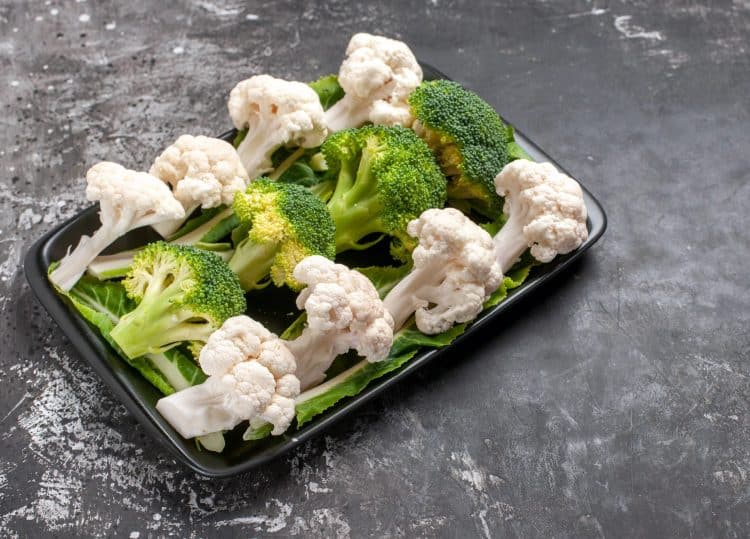
In addition, one type of vegetable has been linked to testosterone production or, more accurately, estrogen suppression, which is every bit as beneficial.
Hormones are typically produced in pairs – like a positive and a negative. For example, where insulin lowers your blood glucose, the hormone glucagon increases it. Adrenalin revs up your metabolism, while cortisol slows things down.
Testosterone’s opposite hormone is estrogen. Where testosterone is all about manliness, estrogen is the primary female sex hormone.
If estrogen levels rise, testosterone levels fall. Exposure to environmental and dietary toxins and certain foods can all increase estrogen levels in your body, driving down your T-levels in the process.
Thankfully, you can combat estrogen with vegetables like cauliflower, cabbage, and broccoli – collectively called cruciferous vegetables.
Cruciferous means cross-like and describes the shape of many of these vegetables. Studies suggest that cruciferous vegetables can act as aromatize inhibitors, which means they stop the conversion to and production of estrogen (6). Lower estrogen means higher testosterone levels by default.
12 of the best estrogen fighting (and therefore testosterone boosting) cruciferous vegetables include:
- Arugula
- Bok choy
- Broccoli
- Brussels sprouts
- Cabbage
- Cauliflower
- Collard greens
- Kale
- Mustard greens
- Rutabaga
- Swiss chard
- Watercress
7. Try ZMA
ZMA, short for Zinc Magnesium Aspartate, is a popular supplement that contains three ingredients linked to increased testosterone production (7). ZMA is also a natural sleep aid which, as you know, is vital for maximizing your testosterone levels.

The three ingredients in ZMA are:
- Zinc: This trace mineral is necessary for the production of more than 300 enzymes involved in metabolism, digestion, immunity, and many other areas of your health, including testosterone production.
- Magnesium: This mineral supports hundreds of chemical reactions in your body, including energy creation and muscle and nerve function.
- Vitamin B6: This water-soluble vitamin is needed for processes such as making neurotransmitters and nutrient metabolism.
While proportions vary slightly from manufacturer to manufacturer, most ZMA products contain:
- Zinc monomethionine: 30 mg — 270% of the Reference Daily Intake (RDI)
- Magnesium aspartate: 450 mg — 110% of the RDI
- Vitamin B6 (pyridoxine): 10 mg — 650% of the RDI
Take one dose of ZMA before going to bed to boost nighttime testosterone production. You may also experience deeper sleep and very lucid dreams when you use ZMA. This is entirely normal and a common side effect of this supplement.
8. Get some sun (or take Vitamin D)
Have you ever noticed how, on a sunny vacation, you tend to feel hornier? Part of the reason is less stress, but another factor is increased Vitamin D production. When you expose your skin to the sun, it responds by making more vitamin D, and vitamin D plays a critical role in testosterone synthesis (8).
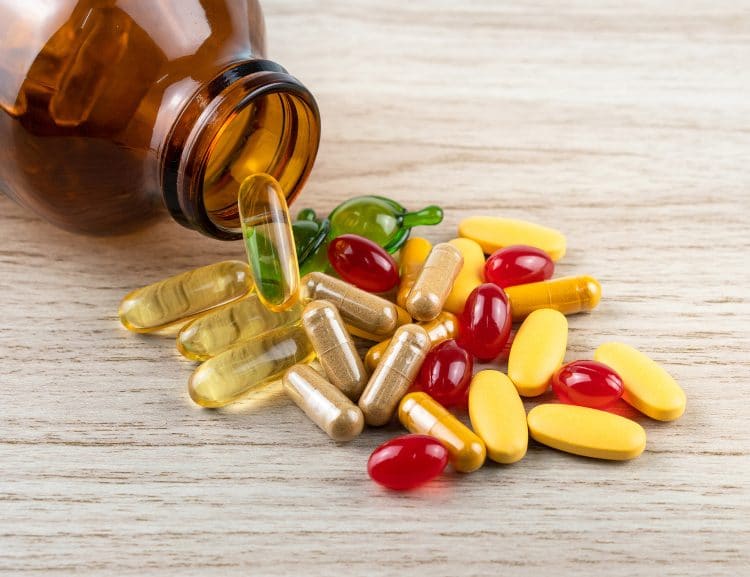
Depending on your lifestyle and where you live, you may fail to get enough exposure to natural sunlight. For example, if you spend your days in an artificially lit office rather than out of doors or live somewhere cold and dark, you probably don’t get to see the sun all that often.
Some people also purposely avoid too much direct sunlight, as they’re concerned about the risk of skin cancer and premature gaining.
20-30 minutes of sun exposure is all you need to optimize vitamin D production. Still, if you prefer to avoid the sun or don’t get outside very much, you can also get your daily allowance of vitamin D from a supplement. A dose of 2-3,000 IU of vitamin D3 per day should be sufficient.
9. Try a testosterone booster
Testosterone boosters are supplements that contain one or several T-boosting ingredients. These ingredients are mostly natural but are present in concentrated amounts to produce optimal results.
Common T-boosting ingredients include:
- Ashwagandha
- Boron
- D-aspartic acid
- DHEA (Dehydroepiandrosterone)
- DIM (Diindolylmethane)
- Fenugreek
- Forskolin
- Ginger
- Horny goat weed
- Maca
- Magnesium
- Saw palmetto
- Tongkat Ali
- Tribulus Terrestris
- Vitamin D
- Zinc
Combined with a healthy diet, getting enough sleep, and hitting the weights, a testosterone booster may help increase your T-levels. However, it’s important to note that, despite reports of drug-like effects, T-boosters have a mild to moderate impact and are nowhere near as potent as steroids.
Increase Testosterone – Wrapping Up
Whatever you are training for, testosterone (or a lack of it) will have a significant impact on your progress. Some men have naturally higher levels than others, but all will eventually suffer the ignominy of declining T-levels. It’s an unavoidable part of the aging process and, as T-levels fall, body fat tends to rise, and muscles get weaker and smaller.
However, while you could resort to HRT, there are plenty of things you can do to maintain or even boost your testosterone levels naturally. For example, dietary and lifestyle changes can have a big impact on testosterone production.
But, as effective as these interventions may be, they cannot compare to doctor-prescribed hormone replacement treatments or taking illicit steroids. However, being natural, these methods are most definitely a whole lot safer.
References:
1– PubMed: Diet and Serum Sex Hormones in Healthy Men https://pubmed.ncbi.nlm.nih.gov/6538617/
2– Journal of Strength and Conditioning Research: The Acute Hormonal Response to Free Weight and Machine Weight Resistance Exercise https://journals.lww.com/
3– Science Direct: Anabolic Hormone Profiles in Elite Military Men – Robust Associations with Age, Stress, And Fatigue https://www.sciencedirect.com/science/article/pii/S0039128X17300806?via%3Dihub
4– PubMed: Sexual Activity and Plasma Testosterone Levels in Hypertensive Males https://www.ncbi.nlm.nih.gov/pubmed/11939610
5– PubMed: Negative Effects of High Glucose Exposure In Human Gonadotropin-Releasing Hormone Neurons https://www.ncbi.nlm.nih.gov/pubmed/24489542
6– PubMed: Natural Products as Aromatase Inhibitors https://www.ncbi.nlm.nih.gov/pmc/articles/PMC3074486/
7– Journal of The American Society of Exercise Physiologists: Effects of a Novel Zinc-Magnesium Formulation on Hormones and Strength https://www.asep.org/asep/asep/BrillaV2.PDF
8– PubMed: Effect of Vitamin D Supplementation on Testosterone Levels in Men https://pubmed.ncbi.nlm.nih.gov/21154195/


